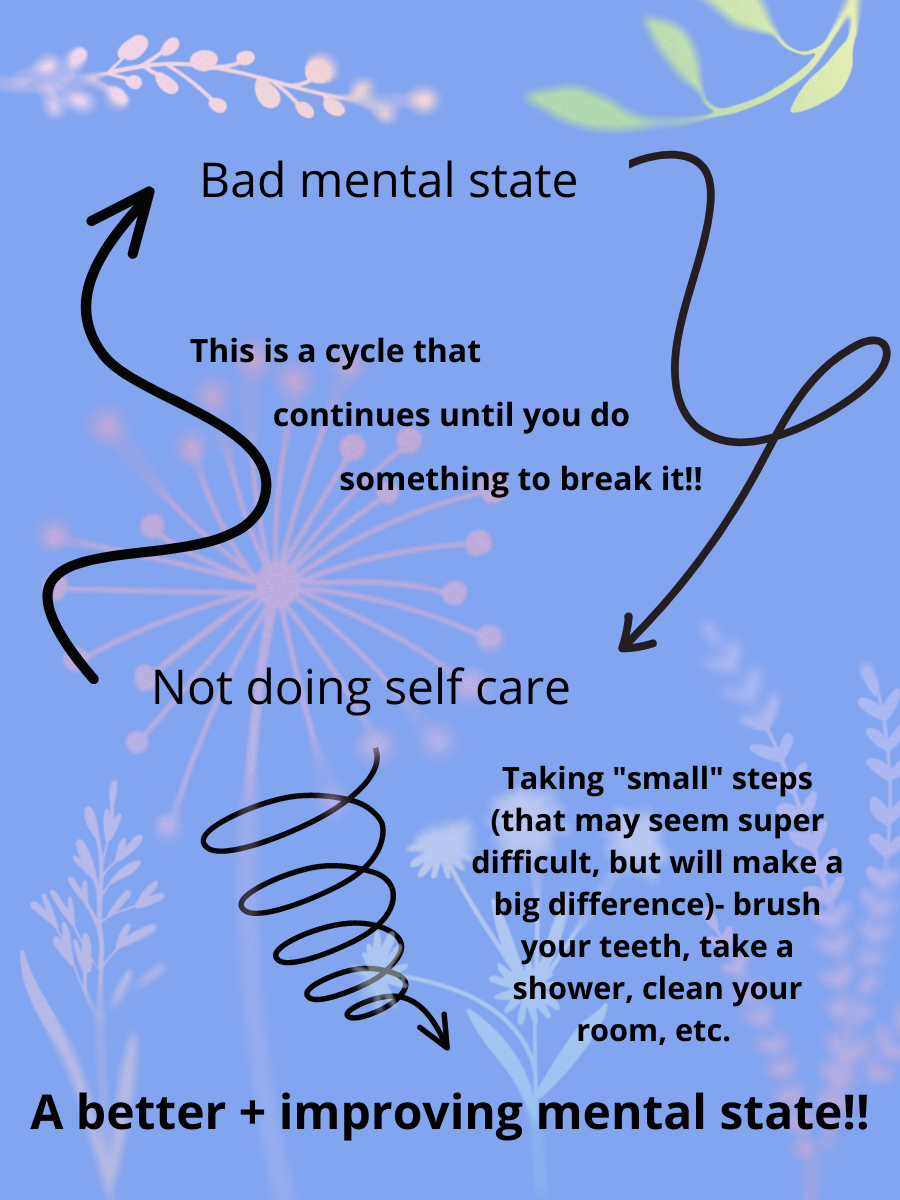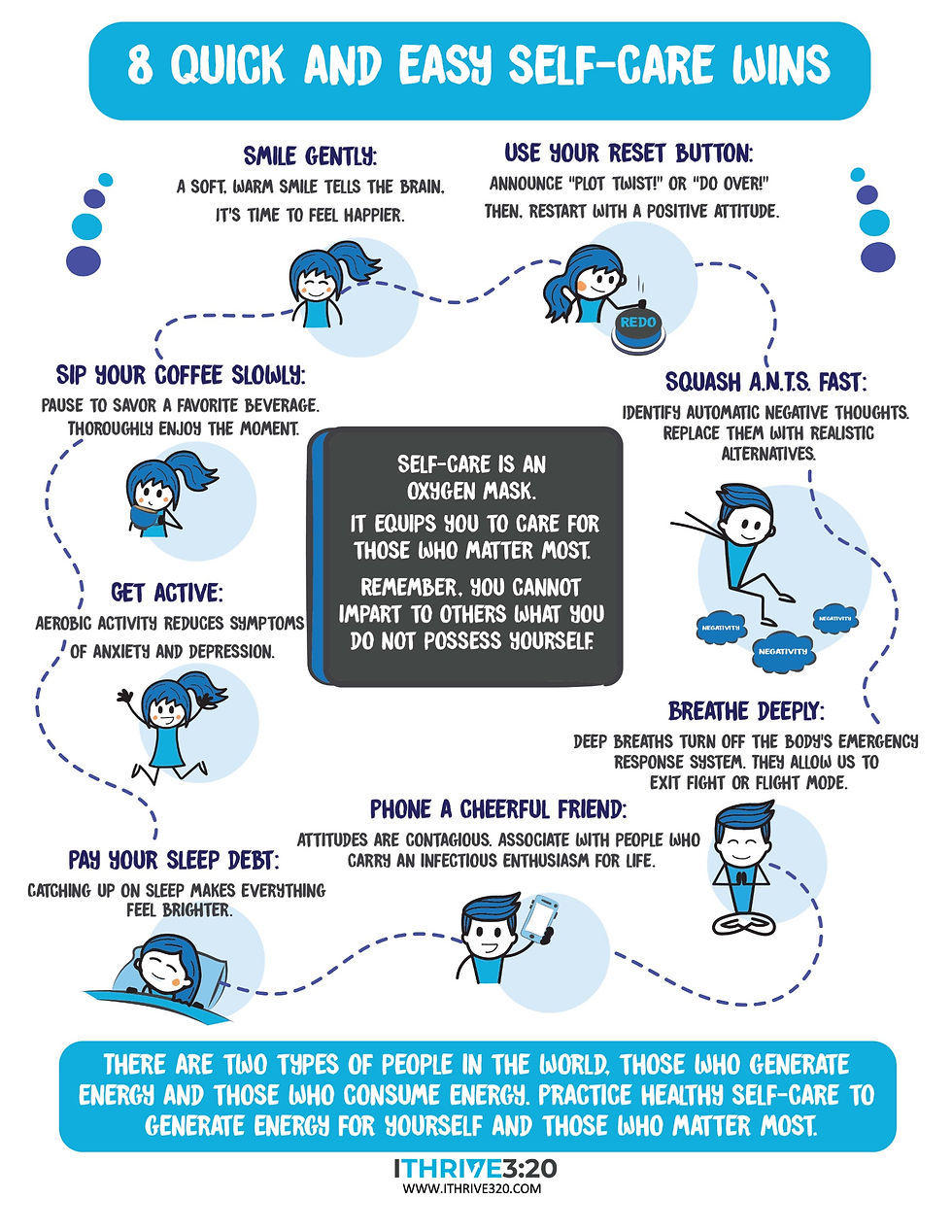Self-care: the practice of taking an active role in protecting one's own well-being and happiness, in particular during periods of stress.
Self-care can come in so many forms and is absolutely dependent on each individual's wants and needs. The type of self-care you should be doing depends on the purpose and your current mental state- are you trying to prevent burnout or heal from it? Are you trying to build habits before school/work starts or trying to de-stress and refresh yourself in the middle of the year or just before tests? Have you tried intentional self-care before? What worked, what didn't? Asking yourself these questions before continuing to read will make it easier to identify what you need, what you should learn from this, and what new things you should try.
First, I'd like to explain the difference between intentional and unintentional self-care. Intentional is things that you have to think about doing, you have to tell yourself "I need to do this to take care of myself and keep myself going, keep myself in this good headspace". Unintentional is mostly habits, things you do just because everyone is "supposed" to do them and it seems to be the most basic things to be considered someone who has their shit together- in fact, whether you know it or not, you all do self-care things every day, they just might not be on purpose. This difference depends on each person, your habits, and your current mental state. When I'm in a good mental state, this is what that divide looks like for me:
Intentional: meditating, journaling, possibly going to therapy, indulging (in moderation) in things that make me happy like chocolate or shopping.
Unintentional: basic hygiene like brushing teeth and taking a shower, eating (more or less) healthy, drinking water, getting up (more or less) on time to go to school and actually getting ready and dressed and doing skincare, and much more that I don't even notice.
When I'm in a bad mental space, however, I'm spending so much of my energy just trying to survive through the day that I don't have much energy left to give to anything else. So, my self-care completely shifts, and things that used to be habits and effortless all of a sudden seem like the hardest thing in the world. When I'm in a bad mental state, this is what the divide looks like:
Intentional: basic hygiene like brushing teeth and taking a shower, eating, drinking water, getting up to go to school and getting ready and doing skincare- notice all of these used to be unintentional.
Unintentional: not much, just doing the bare minimum to get through the day
This is a cycle, and the best way to get out of a bad mental space is to start by doing the things you used to consider habits/effortless/unintentional. Start with the "small" things that are normally unintentional, and work your way up- that's how you'll get out of burnout or any bad mental state. Things like meditation, journaling, etc are still great things to do, but they don't have to be your focus or your first steps- first, get up and brush your teeth. Take a shower, brush your hair, maybe get dressed cute, and you'll immediately start feeling a little better. It can be very difficult to take these first steps but once you've started, it gets so much easier to do the rest.
Here is an infographic depicting the cycle and how to break out of it:

Once you've started with the "small"er steps (although some of these may qualify as those smaller steps for you), you can/should start exploring other methods of self-care to keep your mental health on the right track.
Here are some of the main components of self-care, and some things that you can try within each category:
Things you can incorporate into daily life
Be nice/ give compliments- Karma is real! Don't play! If you give out positive energy into the world, it'll come right back to you.
Smile and laugh- fake it 'til you make it is very real in this case. Science shows that smiling, even if you're just faking it by forcing your lips to make a smile-y shape, actually makes us happier, and same with faking laughs (or hopefully actually laughing). Pro tip: surround yourself with people who make you smile and laugh!
Swear- yes, curse words help us release stress and express ourselves better, so (given it’s at the appropriate time and place), swear!
Journal- helps us take a moment to be self-aware, express our feelings into words, and then communicate them to others better if needed.
Read- enhances brain stuff!! yay!! For example, it keeps the mind sharp and enhances creativity and empathy.
Meditate
Practice gratitude, positivity, affirmations, breathing techniques, and mindfulness
Check out our meditation info packet
Environment
Go outside- touch grass
Have a support system through friends and family, and a therapist can also help.
Declutter/clean up your space- whether that’s your room, your workspace, your closet, etc, having an organized living space is super important (for many people, with some exceptions) to having a decluttered and functioning mind
Spend some time completely unplugged from your devices (whether you're meditating, reading, or hanging with friends), and day-to-day try to spend less time on social media. You can delete the app, or set a time limit in your settings.
Decrease sources of stress- we know it's easier said than done, so if you truly can’t, check out these tips on coping with stress. But if possible, try to reduce your workload, cut out things that aren't necessary or don't interest you as much, or even cut out people who are taking more energy than they should (or who are creating negative energy) in your life.
Physical
Exercise- check out our info packet on the benefits of fitness
Eat healthily and drink water! Stay hydrated! It's also worth noting that eating healthily still means you have to eat- don't diet or fast to lose weight, instead create a balanced diet (which also includes getting a treat every once in a while if that makes you happy!)
Sleep- you can take naps, but getting 7-9 hours of sleep per night is even better! Check out our sleep info packet.
Things you can do when you specifically want to do intentional self-care (for example, if you have been/know you will become particularly stressed)
Aromatherapy- essential oils, candles, and baths- check out our products for each of those!
Dance + new music- both help release stress and create "happiness hormones"! Be on the lookout for a "Music" info packet soon 👀
Retail therapy (in moderation)- be wary of overconsumption, because that's a very prevalent issue with the rise of fast fashion, but sometimes buying something that makes you feel good is just the right solution to a bad day/week. Within reason, do what you gotta do :)
Sex or masturbation- both have been proven to release "happy hormones", soooo you know what to do 👀
Look at something cute! There's a reason people like to watch cute puppy videos. Automatic serotonin boost right there <3
Get a massage! This combines physical touch (one of the love languages, and it's pretty important to human functioning and connection in general), taking time to do intentional self-care, and aromatherapy, plus it just feels good!
Cuddle- again, that physical touch aspect is super important to human connection, so don't be afraid to ask your close family, friends, or significant other for a lil cuddle sesh!
Vacation- everybody needs a break, and working through your lunch break and weekends just isn't sustainable. Not only do you need to consistently take a break during those times, you also need to take longer breaks to let your body and brain relax and refresh. This can be a home or travel vacay, but either way, get outside, move a bit, sleep, and do some other things on this list (which does not include watching Netflix 24/7, although shows can definitely be helpful, in moderation, to relax)!
Here are some of the sources we used to come up with this list:
Here are some more examples of how you can care for yourself in several different ways:

Here are some more broad examples of how to maintain a good mental state:

While many of these tips are meant to care for your mental health and wellbeing, emotional health is just as important (and yes, emotional and mental health are different! Mental health is more general and deals more with processing experiences and stress, while emotional health deals more with emotions and relationships.) If you want to further explore emotional health, you can check out our info packet on heartbreak and healthy relationships. Here are a few examples of things that specifically nourish your emotional health:

Self-care is incredibly important- for your mental, physical, and emotional health, as well as your relationships with the people and world around you. We hope you learned something and will implement some of these tips in your daily life :) Thank you for reading!
If you'd like to print out this info packet, the easiest way is to print this google doc! FYI: It doesn't have all the links and related info that are on the online versions:

Comentarios